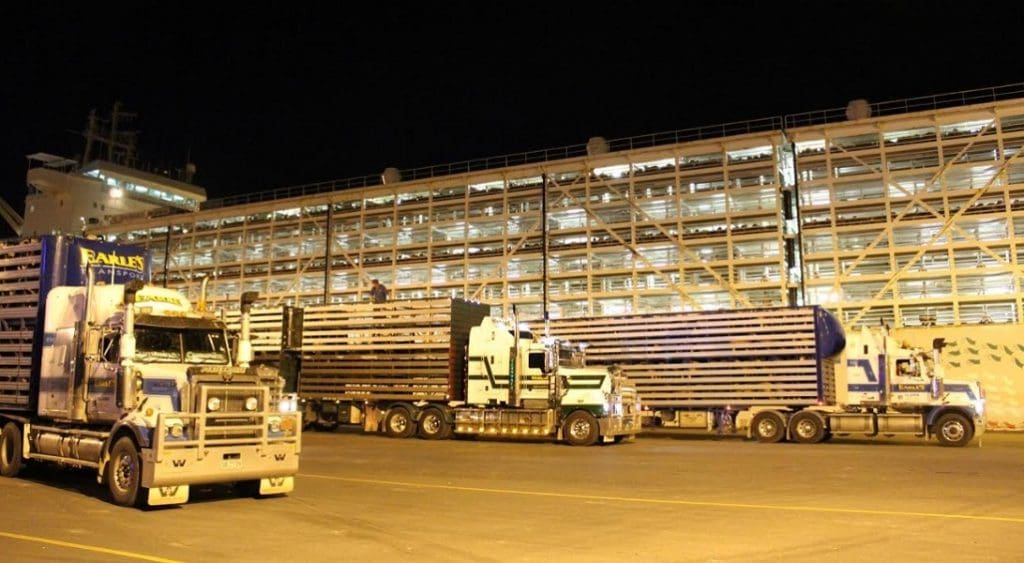
The MV Al Shuwaikh being loaded with sheep at Adelaide last year.
MAJOR Middle East sheep importer the Kuwait Livestock Transport and Trading Company is hitting hurdles in its attempt to supplement limited Australian supplies with a South African shipment.
Last month Sheep Central reported that the KLTT’s Al Shuwaikh was on its way to South Africa for sheep and on October 4 the loading of about 57,000 sheep was finalised in the port of East London.
However, after the Al Shuwaikh was loaded, the country’s National Society for the Prevention of Cruelty to Animals said it would be taking legal action in relation to the shipment and to stop further live exports.
Western Australia’s Pastoralists and Graziers Association president Tony Seabrook last month expressed concern that Al Mawashi/Kuwait Livestock Transport and Trading Company was looking to other countries for sheep, including South Africa, due to the extended ME shipment moratorium from Australia, from 1 June to 22 September.
“We are seeing a company of the size and scale of KLTT basically say to Australia ‘we regard you as an unreliable supplier and we have to set up other supply chains,” Mr Seabrook said.
Another KLTT vessel, the Al Messilah, loaded about 60,000 sheep and some cattle at Fremantle late last month for the Middle East, but the company has also been sourcing sheep out of Somalia and Romania to replace supply from Australia during the current trade suspension.
During a visit to Australia last year, Al Mawashi chief executive officer Osama Boodai said Kuwait’s food security needs and doubts about Australian sheep exports meant the company is looking to find other secure sources of livestock.
NSCPA preparing animal cruelty charges
An NSCPA media statement said its inspectors monitored the load of sheep onto the Al Shuwaikh from October 1-4 and it would be laying charges in terms of the Animals Protection Act No 71 of 1962 against the South African Government, including the Provincial Government, as well as animal cruelty charges, assault charges and multiple charges of obstruction against the personnel that handled the animals inhumanely, those that assaulted and hindered NSPCA Inspectors from fulfilling their duties, and personnel of Al Mawashi, who have a registered company in South Africa.
The NSPCA said it would also take the necessary legal action “to ensure that there is an end to the unacceptable and unnecessary cruelty involved in the live export trade.”
NSPCA spokeswoman Meg Wilson said evidence collected over the last four days “will protect millions of animals from ever being loaded onto these death ships in the future.”
The NSCPA claimed South Africa’s director of Veterinary Public Health of the Department of Agriculture Dr Mphane Molefe accompanied the NSPCA’s veterinarian and a senior inspector on an inspection of the vessel on 3 October.
“Dr Molefe appeared to be horrified at the conditions on board the ship, including dangerously high ammonia levels on some of the decks, parasitic conditions including faeces in food and water troughs, among other serious concerns, this was only on day 2.5 of the loading – the sheep still have to endure these worsening conditions for their entire journey.
“Curiously, later that day, two veterinarians from the provincial government department undertook an inspection and advised our inspectors that nothing was wrong,” the NSCPA statement said.
The NSPCA said it appealed to the provincial government representatives to put a stop to the loading claiming animals were being manhandled as a result of exhausted handlers and the dark conditions, “but the intransigent government officials stood by and did nothing.”
Mr Boodai nor Mr Molefe were emailed questions about the shipment inspection and sheep condition but had not responded before this report was published.

HAVE YOUR SAY